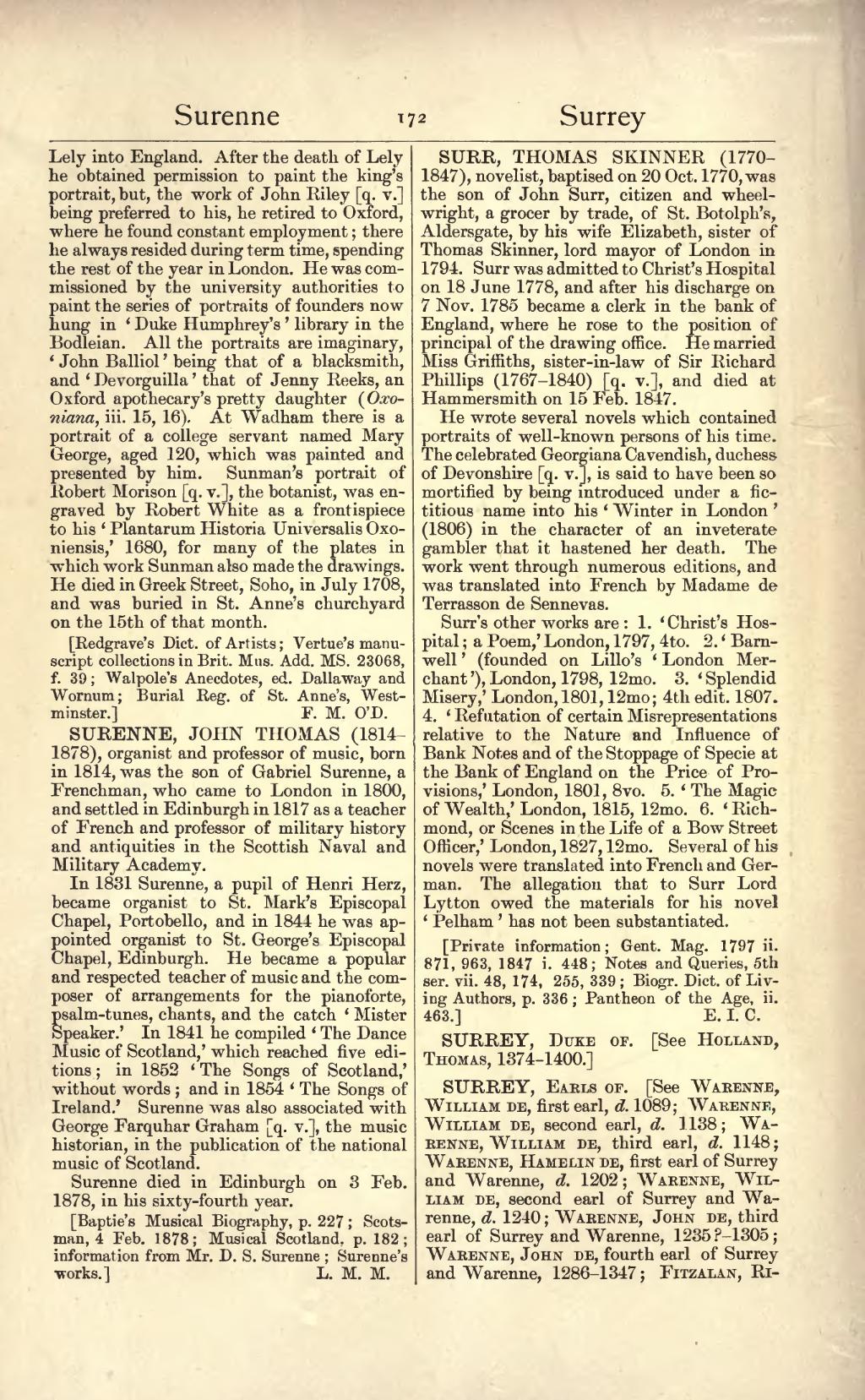Lely into England. After the death of Lely he obtained permission to paint the king's portrait, but, the work of John Riley [q. v.] being preferred to his, he retired to Oxford, where he found constant employment; there he always resided during term time, spending the rest of the year in London. He was commissioned by the university authorities to paint the series of portraits of founders now hung in ‘Duke Humphrey's’ library in the Bodleian. All the portraits are imaginary, ‘John Balliol’ being that of a blacksmith, and ‘Devorguilla’ that of Jenny Reeks, an Oxford apothecary's pretty daughter (Oxoniana, iii. 15, 16). At Wadham there is a portrait of a college servant named Mary George, aged 120, which was painted and presented by him. Sunman's portrait of Robert Morison [q. v.], the botanist, was engraved by Robert White as a frontispiece to his ‘Plantarum Historia Universalis Oxoniensis,’ 1680, for many of the plates in which work Sunman also made the drawings. He died in Greek Street, Soho, in July 1708, and was buried in St. Anne's churchyard on the 15th of that month.
[Redgrave's Dict. of Artists; Vertue's manuscript collections in Brit. Mus. Add. MS. 23068, f. 39; Walpole's Anecdotes, ed. Dallaway and Wornum; Burial Reg. of St. Anne's, Westminster.]
SURENNE, JOHN THOMAS (1814–1878), organist and professor of music, born in 1814, was the son of Gabriel Surenne, a Frenchman, who came to London in 1800, and settled in Edinburgh in 1817 as a teacher of French and professor of military history and antiquities in the Scottish Naval and Military Academy.
In 1831 Surenne, a pupil of Henri Herz, became organist to St. Mark's Episcopal Chapel, Portobello, and in 1844 he was appointed organist to St. George's Episcopal Chapel, Edinburgh. He became a popular and respected teacher of music and the composer of arrangements for the pianoforte, psalm-tunes, chants, and the catch ‘Mister Speaker.’ In 1841 he compiled ‘The Dance Music of Scotland,’ which reached five editions; in 1852 ‘The Songs of Scotland,’ without words; and in 1854 ‘The Songs of Ireland.’ Surenne was also associated with George Farquhar Graham [q. v.], the music historian, in the publication of the national music of Scotland.
Surenne died in Edinburgh on 3 Feb. 1878, in his sixty-fourth year.
[Baptie's Musical Biography, p. 227; Scotsman, 4 Feb. 1878; Musical Scotland, p. 182; information from Mr. D. S. Surenne; Surenne's works.]
SURR, THOMAS SKINNER (1770–1847), novelist, baptised on 20 Oct. 1770, was the son of John Surr, citizen and wheelwright, a grocer by trade, of St. Botolph's, Aldersgate, by his wife Elizabeth, sister of Thomas Skinner, lord mayor of London in 1794. Surr was admitted to Christ's Hospital on 18 June 1778, and after his discharge on 7 Nov. 1785 became a clerk in the bank of England, where he rose to the position of principal of the drawing office. He married Miss Griffiths, sister-in-law of Sir Richard Phillips (1767–1840) [q. v.], and died at Hammersmith on 15 Feb. 1847.
He wrote several novels which contained portraits of well-known persons of his time. The celebrated Georgiana Cavendish, duchess of Devonshire [q. v.], is said to have been so mortified by being introduced under a fictitious name into his ‘Winter in London’ (1806) in the character of an inveterate gambler that it hastened her death. The work went through numerous editions, and was translated into French by Madame de Terrasson de Sennevas.
Surr's other works are:
- ‘Christ's Hospital; a Poem,’ London, 1797, 4to.
- ‘Barnwell’ (founded on Lillo's ‘London Merchant’), London, 1798, 12mo.
- ‘Splendid Misery,’ London, 1801, 12mo; 4th edit. 1807.
- ‘Refutation of certain Misrepresentations relative to the Nature and Influence of Bank Notes and of the Stoppage of Specie at the Bank of England on the Price of Provisions,’ London, 1801, 8vo.
- ‘The Magic of Wealth,’ London, 1815, 12mo.
- ‘Richmond, or Scenes in the Life of a Bow Street Officer,’ London, 1827, 12mo.
Several of his novels were translated into French and German. The allegation that to Surr Lord Lytton owed the materials for his novel ‘Pelham’ has not been substantiated.
[Private information; Gent. Mag. 1797 ii. 871, 963, 1847 i. 448; Notes and Queries, 5th ser. vii. 48, 174, 255, 339; Biogr. Dict. of Living Authors, p. 336; Pantheon of the Age, ii. 463.]
SURREY, Duke of [See Holland, Thomas, 1374-1400.]
SURREY, Earls of. [See Warenne, William de, first earl, d. 1089; Warenne, William de, second earl, d. 1138; Warenne, William de, third earl, d. 1148; Warenne, Hamelin de, first earl of Surrey and Warenne, d. 1202; Warenne, William de, second earl of Surrey and Warenne, d. 1240; Warenne, John de, third earl of Surrey and Warenne, 1235?-1305; Warenne, John de, fourth earl of Surrey and Warenne, 1286-1347; Fitzalan, Ri-
